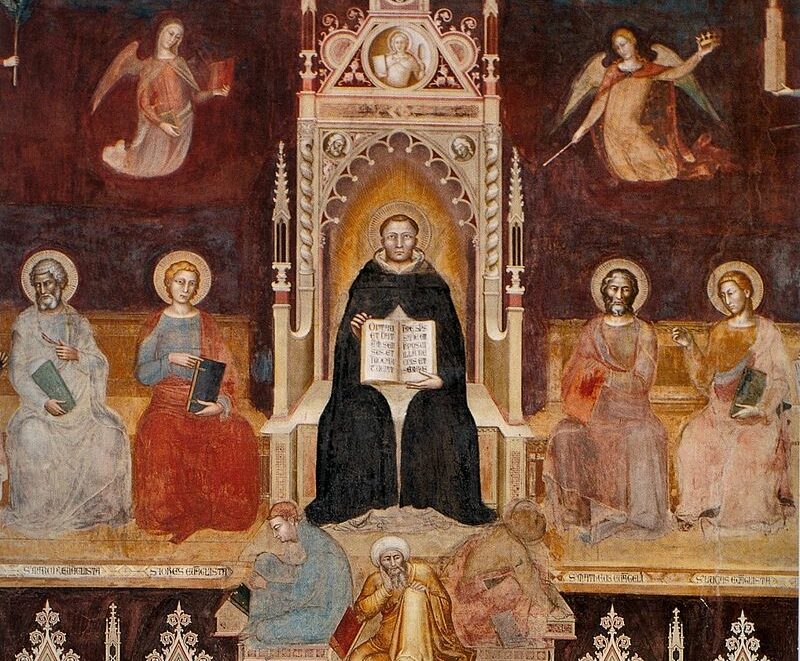
The 2021 Aquinas Lecture, Yearning for Transcendence: Christian Platonism and Werner Beierwaltes, was given on Thursday 28 January on Zoom by Professor Douglas Hedley, Professor of Philosophy of Religion at the University of Cambridge. We were pleased to see new friends joining us from Finland, Germany and Italy.
A link to the video on YouTube is below.
Introduction
St. Thomas Aquinas had two major philosophical (re)sources: Aristotle, and Plato and the Neo-Platonists. Both traditions are very much alive today: a recent representative of Platonism was Werner Beierwaltes (1931-2019), an eminent German historian of philosophy, writing systematic expositions of Proclus, commentaries on Plotinus and other monographs. Beierwaltes gives us meditations upon Neo-Platonic themes throughout the history of philosophy: Thinking the One, Identity and Difference, The True Self. Far more than merely a historian of ideas, Beierwaltes wrote as a Christian Platonist, exploring the dialectical relationship of revealed mystery and speculative truths, and the metaphysical significance of some of the key tenets of Christian thought.
Owing to technical difficulties, we regret that the first couple of paragraphs of Douglas’ lecture were missed from the recording. We reproduce them below, followed by the link.
Yearning for Transcendence:
Christian Platonism and Werner Beierwaltes
Werner Beierwaltes was undoubtedly an eminent historian of philosophy. His magnificent oeuvre is accessible in the beautiful editions of Vittorio Klostermann, from his early systematic exposition of Proclus and his commentaries on Plotinus to his monographs; these are meditations upon Neoplatonic themes throughout the history of philosophy: Thinking the One, Identity and Difference, The True Self. While one might be excused for thinking that this was merely an exercise in comprehensive history of ideas or a protocol of the history of philosophy sine ira et studio, Beierwaltes had a philosophical agenda: he wrote as a Christian Platonist, for and within a living tradition of thought. In this essay I would like to explore the philosophy of Werner Beierwaltes. Unlike the Thomist division of labour between philosophy and religion, natural and revealed theology, Beierwaltes explored the dialectical relationship of revealed mystery and speculative truths. He was not so much concerned with the compatibility of Christianity with reason as much as the metaphysical significance of some of the key tenets of Christian thought as developed in the wake of the logos theorizing and Trinitarian speculation of the Christian-Neoplatonic inheritance. This agenda was not, as it was for his eminent contemporary Kurt Flasch, an outmoded concept – ‘ein verschollenes Konzept’ (Meister Eckhart, 31), but the driving principle and inspiration of his work.[1]
In this paper I will be presenting the philosophy of Beierwaltes ‘Christianus simulque vere Platonicus’.[2] Not that one can sense any mawkish piety in his work, and there was an aversion to any dogmatism or irrational fanaticism in his thought. Religion was part of his heritage and a central theme of his philosophizing. One might say that for Beierwaltes religion without philosophy is blind; philosophy without religion empty. His funeral was held in the Church in Klingenberg in 2019 in Franconia where he was baptized, and in the Church where he once played the organ. Family members, friends and pupils gathered in this large Franconian Church. The service was led by one of his students, the revd professor Marc-Aeilko Aris. I was struck by a photo at the front of the Church, a portrait of Werner Beierwaltes. His face seemed all seeing. It took me back to my student days in a seminar in Munich on Nicholas of Cusa’s De visione Dei. Cusa was a central influence on Beierwaltes. The icon of Christ in that work, dedicated to the monks of Tegernsee, is presented as a cipher for the providence of the Deity. In that seminar we explored Cusa’s familiar notion of God as the coincidentia oppositorum: the breaching of Aristotelian categories through Neoplatonic negative theology. God is at once the idem as absolute identity, possest the ground of all reality actual and potential, and non aliud: the radically transcendent presence. The icon presented to the monks at Tegernsee is a token here of the unity of the soul’s vision and the vision of God: the opening up of thought and self-reflection to that incommensurable principle and source of Being, to the ineffable and un-sayable (ἄρρητον). This furnishes the fundamentally religious dimension in Beierwaltes’ philosophizing.
[1] For Beierwaltes on Flasch, see W. Beierwaltes, Catena Aurea, ed. V. Klosterman, 2017, pp.243-ff.
[2] W. Beierwaltes, Platonismus im Christentum, ed. V. Klosterman, 2001, p. 84.
Now please go the video (click here).

